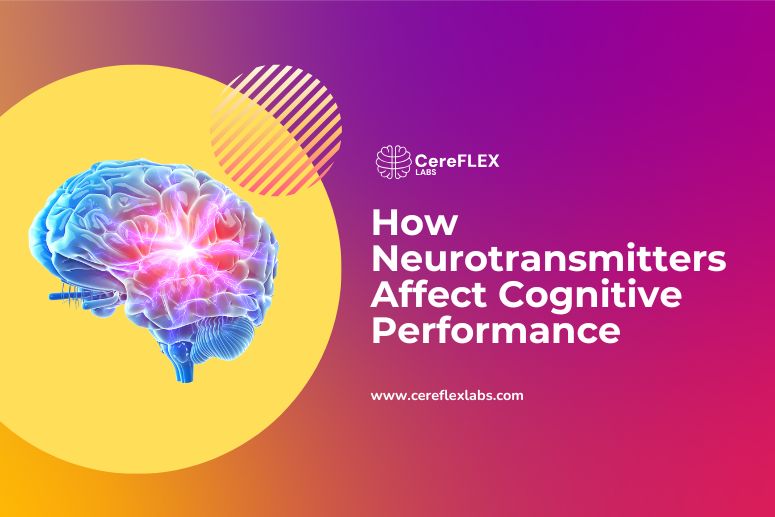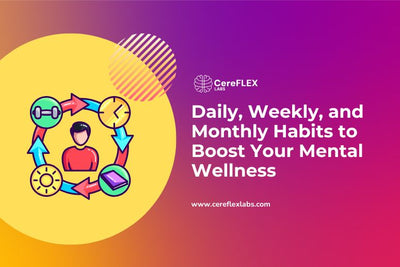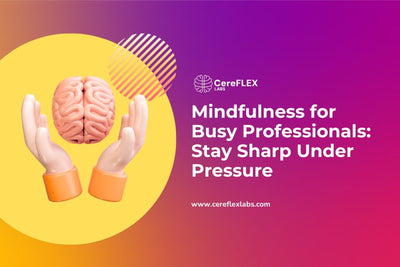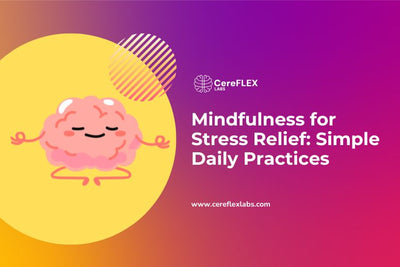Neurotransmitters are your brain’s chemical messengers. They help control memory, focus, mood, motivation, and how clearly you think.
When your neurotransmitters are in balance, mental tasks feel easier. You focus better, retain information more efficiently, and manage stress with greater resilience. But when these messengers fall out of sync, symptoms like brain fog, poor concentration, low motivation, or mood swings can set in.
Understanding how neurotransmitters work is a powerful step toward better brain health. These chemicals are also involved in neuroplasticity—the brain’s ability to adapt and rewire in response to learning, experience, and recovery.
Although factors like stress, sleep, diet, and age can disrupt this balance, there are natural ways to support it. From lifestyle changes to herbal support, small steps can make a big difference in cognitive performance.

What are neurotransmitters?
Neurotransmitters are chemical messengers that allow nerve cells to communicate with each other — and with the rest of your body.
They transmit signals from one neuron to another across tiny spaces called synapses. This process powers nearly everything your nervous system controls, from your thoughts and emotions to breathing and movement.
In essence, your brain and body depend on neurotransmitters to function. They coordinate how you think, feel, move, and react — shaping everything from decision-making to stress response.

How Neurotransmitters Work in the Body
Neurons don’t touch — they’re separated by tiny fluid-filled gaps called synapses. For a message to pass from one neuron to the next, it must cross this space.
That’s where neurotransmitters come in.
When a neuron receives a signal, it releases neurotransmitter molecules into the synapse. These molecules then bind to receptors on the next cell, passing the message forward. Once the message is delivered, the neurotransmitters are either broken down or reabsorbed.
This signalling system powers communication throughout the central nervous system, which includes the brain and spinal cord. It regulates everything from muscle movement to decision-making.
Your body produces and stores thousands of these chemical messengers — each with a specific role in maintaining physical and mental performance.
What body functions do nerves and neurotransmitters help control?
Neurotransmitters are at the heart of your body's communication system. Working through the nervous system, they influence nearly every major function — both physical and mental.
Here’s what they help regulate:
- Breathing and heart rate
- Muscle coordination and reflexes
- Focus, memory, learning, and emotions
- Hormone release and balance
- Stress response and mental clarity
- Sleep cycles, healing, and ageing
- Appetite, digestion, and thirst
- Sensory perception — sight, touch, smell, and more
When neurotransmitters are balanced, your brain functions smoothly. You think faster, feel more emotionally stable, and retain information more easily. But when they’re out of sync, symptoms like anxiety, brain fog, and fatigue often appear.
Maintaining this delicate chemical balance is essential for long-term cognitive health and daily performance.
The Big 5 Neurotransmitters and Their Cognitive Roles
Your brain contains more than 100 known neurotransmitters — each with specific effects on how you think, feel, and function. But five of them stand out for their powerful influence on cognition and mental health.
Let’s break down the “Big 5” and how they shape different areas of brain performance.

Dopamine: Focus, Motivation & Reward
Dopamine plays a central role in goal-setting, learning, memory, and behaviour. Often called the brain’s “reward chemical,” it’s released during pleasurable activities and helps reinforce motivation.
Low dopamine levels are linked to conditions like depression, addiction, and Parkinson’s disease. Although there are no direct dopamine supplements, nutrients like L-tyrosine and regular physical activity can support its production and function.
Serotonin: Mood, Sleep & Emotional Stability
Serotonin helps regulate mood, sleep cycles, memory, and even appetite. It’s closely tied to feelings of calm, confidence, and emotional resilience.
Low serotonin is associated with anxiety, depression, and seasonal mood disorders. Many antidepressants — such as SSRIs and SNRIs — work by increasing serotonin levels to improve mood and reduce emotional instability.
Acetylcholine: Learning, Memory & Mental Sharpness
Acetylcholine supports attention, short-term memory, and learning. It also plays a role in motor control, heart rate regulation, and the production of sweat and saliva.
Insufficient acetylcholine is linked to cognitive decline and memory loss, especially in conditions like Alzheimer’s. Some treatments aim to slow its breakdown in the brain, while nutrients like choline and certain herbs may help boost levels naturally.
Norepinephrine: Alertness, Attention & Stress Response
Norepinephrine, also known as noradrenaline, is involved in your brain’s fight-or-flight response. It heightens focus, speeds up reaction time, and helps the brain prioritize urgent information.
It rises during times of stress and drops during sleep. Imbalances can contribute to brain fog, difficulty concentrating, or — when elevated chronically — anxiety and restlessness.
GABA: Calm, Sleep & Cognitive Relaxation
GABA (gamma-aminobutyric acid) is your brain’s main inhibitory neurotransmitter — meaning it slows down overactivity and promotes calm.
It helps reduce anxiety, improve sleep quality, and maintain emotional balance. Low GABA levels are often linked to nervousness, insomnia, and overstimulation, making it a key target for stress support and mental clarity.
Neurotransmitter Imbalances and Cognitive Dysfunction
When neurotransmitter levels are too high or too low, your brain’s internal communication system becomes disrupted. The result? Slower thinking, emotional ups and downs, and problems with memory or focus.
Each neurotransmitter has a specific role. So when one falls out of balance, the symptoms often reflect that:
- Low dopamine → low motivation and difficulty concentrating
- Low serotonin → mood swings, irritability, sleep disturbances
- Low acetylcholine → forgetfulness and attention issues
- Low GABA → anxious thoughts, restlessness, overstimulation
These imbalances can show up as brain fog, fatigue, poor decision-making, and emotional instability. In more severe cases, they may contribute to cognitive dysfunction, especially if left unaddressed.
Even mild imbalances can chip away at your cognitive performance over time — reducing clarity, speed, and resilience in how you think and respond.
What Causes Neurotransmitter Imbalances?
Neurotransmitter levels can shift due to a mix of internal and external factors. While genetics play a role, lifestyle and environment often have a bigger day-to-day impact than most people realize.
Here are five common contributors:

Genetics
Some people naturally produce more — or less — of certain neurotransmitters. Your genes influence how well your brain creates, releases, and reabsorbs these chemical messengers. But even genetic tendencies can be shaped by your environment, diet, and stress levels.
Nutritional Deficiencies
The brain needs specific nutrients (like B vitamins, magnesium, and amino acids) to make neurotransmitters. A poor diet, gut absorption issues, or blood sugar swings can all interfere with this process. Food intolerances, like gluten sensitivity, may also disrupt neurotransmitter balance in sensitive individuals.
Hormonal Changes
Hormones interact with brain chemistry. For example, lower estrogen can reduce serotonin, while lower progesterone may impact GABA levels. This is why neurotransmitter imbalances often show up during menopause, PMS, or after major hormonal shifts.
Lifestyle Stressors
Chronic stress raises cortisol — a hormone that can lower serotonin and GABA over time. Poor sleep, lack of exercise, and irregular eating patterns can also deplete neurotransmitter stores and impair their function.
Gut-Brain Disruption
The gut isn’t just for digestion — it’s also a key site of neurotransmitter production. In fact, over 90% of serotonin and more than 40 other neurotransmitters are made in the gut. Conditions like leaky gut or microbial imbalances (dysbiosis) can throw off this production and affect brain health.
Natural Ways to Support Neurotransmitter Balance
Supporting your brain chemistry doesn’t always require prescriptions. With consistent lifestyle habits and targeted nutrients, you can help keep your neurotransmitters working in sync — naturally.

Lifestyle Strategies That Support Brain Chemistry
Simple daily choices can shape how your brain produces and uses neurotransmitters. These foundational habits build long-term mental resilience:
✔ Sleep: Aim for 7–9 hours of restful sleep. This helps regulate dopamine and serotonin and prevents mental fatigue.
✔ Nutrition: Focus on a whole-food diet rich in B vitamins, omega-3s, magnesium, and high-quality protein — key building blocks for neurotransmitter synthesis.
✔ Exercise: Regular movement, especially aerobic workouts, boosts dopamine, releases endorphins, and improves brain oxygenation.
✔ Mindfulness Practices: Activities like meditation, deep breathing, journaling, or walking in nature can increase GABA levels and reduce stress hormones like cortisol.
Herbal and Nutritional Tools for Mental Support
Certain herbs and amino acids can support neurotransmitter function and enhance mental performance:
- Adaptogens (e.g., Ashwagandha, Rhodiola): Help regulate stress hormones and stabilize brain chemistry.
- Nootropic herbs (e.g., Bacopa monnieri, Ginkgo biloba): Support memory, focus, and processing speed.
-
Amino acids (e.g., L-tyrosine, L-tryptophan): Provide the raw materials your brain needs to create dopamine and serotonin.
Real-Life Applications: How Neurotransmitter Support Looks in Practice
Neurotransmitter balance isn’t just a theory — it affects how people feel, think, and perform every day. Here’s how different groups can benefit from natural strategies and support tools.
Athletes
Competitive athletes often push their mental and physical limits. High training stress and pressure to perform can impact dopamine and norepinephrine — key for focus and motivation.
- L-tyrosine may help support dopamine during periods of intense mental demand.
- Rhodiola rosea, an adaptogen, can help buffer the effects of stress and improve resilience.
- Consistent sleep and recovery are essential for GABA and serotonin balance — both of which impact mood and reaction time.
Students
During exams or high-pressure projects, students rely on memory, attention, and emotional regulation — all closely tied to neurotransmitters like acetylcholine and serotonin.
- Bacopa monnieri may support memory retention and reduce test anxiety.
- Balanced meals and hydration support acetylcholine synthesis and steady blood sugar, both of which influence focus and learning.
- Sleep is non-negotiable — it consolidates memories and resets brain chemistry for the next day.
Older Adults
As we age, natural levels of dopamine, acetylcholine, and GABA may decline — sometimes showing up as slower recall, mood changes, or mental fatigue.
- Ginkgo biloba may help enhance blood flow to the brain and support cognitive clarity.
- Magnesium supports GABA activity and promotes better sleep and calm.
- Brain-friendly habits — like walking, puzzles, or mindfulness — help preserve function and mood.

Choosing High-Quality Herbal Supplements
Not all supplements are created equal. If you’re supporting your neurotransmitters through herbs or nootropics, quality matters — a lot.
Low-quality products may contain filler ingredients, inconsistent dosages, or lack third-party verification. This not only reduces effectiveness but can also pose risks to your health.
What to Look For
✔ Third-party testing: Verifies purity, potency, and absence of harmful contaminants.
✔ Standardized extracts: Ensure consistent active ingredient levels across batches.
✔ Transparent labels: Include full ingredient lists with specific dosages — no vague “proprietary blends.”
✔ Proper certifications: In Canada, look for a Natural Product Number (NPN) issued by Health Canada.
Red Flags
✘ No testing or certification details listed
✘ Claims that sound too good to be true (e.g. “cures brain fog instantly”)
✘ Vague or incomplete ingredient labels
✘ Overuse of buzzwords like “miracle,” “breakthrough,” or “advanced formula” without explanation
CereFlex AM/PM Protocol: A Science-Backed Brain Support System
The CereFlex AM/PM Protocol is a two-part supplement system designed to support cognitive function throughout the day — energizing in the morning, calming in the evening.
AM Formula: Focus, Energy & Clarity
The morning blend includes L-Tyrosine, Rhodiola rosea, and Asian ginseng — ingredients known to support dopamine levels, promote mental stamina, and sharpen focus without overstimulation.
PM Formula: Calm, Sleep & Repair
The evening blend contains Magnesium and Ginkgo biloba, which help relax the nervous system and promote better sleep — while also supporting blood flow and overnight cognitive repair.
What Sets CereFlex Apart
✔ Full ingredient transparency — no hidden blends or vague claims
✔ Clinical-strength dosages backed by research
✔ NPN-certified by Health Canada for safety and efficacy
✔ GMP-compliant manufacturing for consistent quality
If you’re looking for a reliable way to support memory, mood, and mental recovery — without guessing what’s in the bottle — the CereFlex AM/PM Protocol is worth exploring.
Conclusion: Supporting Brain Chemistry, Naturally
Your brain relies on a delicate balance of neurotransmitters to function at its best. When these messengers are in sync, tasks feel easier, focus sharpens, and your mood stays steady. But when that balance slips, so can your mental performance.
Fortunately, there’s a lot you can do to support brain chemistry — starting with the basics: sleep, nutrition, stress management, and regular movement.
When additional support is needed, herbal ingredients and targeted supplements may help. Tools like the CereFlex AM/PM Protocol offer a structured, science-backed approach to nourishing your brain morning and night — without overpromising or cutting corners.
By taking small, informed steps, you can build a stronger foundation for cognitive health — one that supports you now and in the long run.






